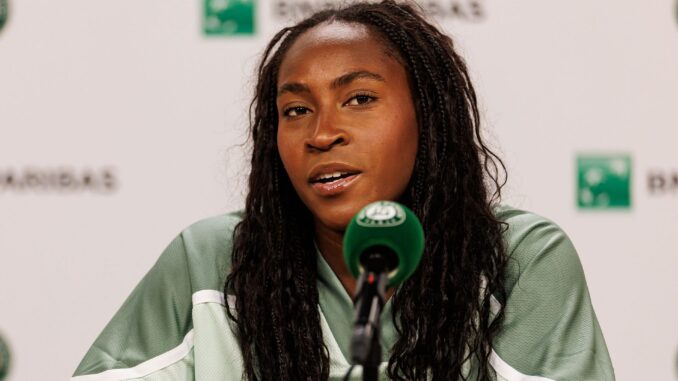
In a moment that transcended the boundaries of sport, Coco Gauff, the young American tennis prodigy, used her platform at the 2022 French Open to deliver a powerful message about gun violence in the United States. At just 18 years old, Gauff had already captured the world’s attention with her remarkable talent, but it was her courage and conviction off the court that left an indelible mark. After a commanding 6-3, 6-1 semifinal victory over Italy’s Martina Trevisan at Roland Garros, Gauff seized the opportunity to address a pressing societal issue. As she approached the courtside TV camera, she wrote, “Peace. End gun violence,” followed by a heart emoji, a poignant plea that resonated with audiences worldwide.
The backdrop to Gauff’s message was a series of tragic events in the United States. Just weeks before her semifinal triumph, a horrific shooting at a Tulsa medical center and the devastating school shooting in Uvalde, Texas, had shaken the nation. These incidents, coupled with Gauff’s personal connection to the 2018 Parkland school shooting—where she had friends who survived the tragedy—fueled her resolve to speak out. “For me, it’s kind of close to home,” Gauff later shared, reflecting on the Parkland massacre that claimed 17 lives. Her words carried the weight of someone who had witnessed the ripple effects of gun violence firsthand, making her message all the more compelling.
Gauff’s decision to write her message on the camera lens was not a spontaneous act but a deliberate choice to leverage her newfound spotlight. Having reached her first Grand Slam final, she became the youngest finalist at a major since Maria Sharapova in 2004. Yet, for Gauff, the significance of her achievement paled in comparison to the urgent need for change. “I think that we definitely need some change and reform regarding that aspect,” she told reporters, emphasizing her commitment to using her platform for advocacy. “Ever since I was young, you guys know I use my platform to bring attention to topics, and today was one of those days.”
Her message sparked a wave of reactions, from applause in the Paris crowd to widespread praise on social media. Gauff, however, remained unfazed by both the support and the inevitable criticism. In an interview with The Guardian ahead of the Wimbledon Championships, she stood firm in her stance. “I don’t really care about the praise or the backlash,” she declared, showcasing a maturity beyond her years. “I’m aware of that. So I try to make sure I use it to speak out about issues that can maybe slightly change some things. You know, I don’t think I’m going to change the world. I’m not delusional, but I think it could change some people in the world.”
Gauff’s activism draws inspiration from trailblazers like LeBron James, Serena Williams, Billie Jean King, Colin Kaepernick, and Naomi Osaka, who have all used their platforms to advocate for social justice. Her actions at the French Open were part of a broader pattern of speaking out on issues close to her heart, including climate change and the Black Lives Matter movement, which she supported at a 2020 march. “Since I was younger, my dad told me I could change the world with my racquet,” Gauff explained. “He didn’t mean that by just playing tennis.” This philosophy has guided her approach, blending her athletic prowess with a deep sense of responsibility.
Despite her loss to world number one Iga Swiatek in the French Open final, Gauff’s message endured, sparking conversations about gun violence and the role of athletes in activism. She acknowledged the limitations of her influence, noting, “It’s not about writing a message just to end it, it’s not going to stop on the spot, I agree. But for me, it’s about influencing people and influencing the leaders that are in office and leaders around the world maybe to hear that message.” Her words underscored a pragmatic yet hopeful outlook, recognizing that change is incremental but worth pursuing.
Gauff’s stand also highlighted her unique position as a young Black athlete carrying forward the legacy of tennis icons like Venus and Serena Williams, as well as Arthur Ashe’s commitment to racial justice. As she prepared for Wimbledon, her focus remained on both her game and her principles, undeterred by the pressures of fame. “I am not going to stress over a tennis match,” she said during an on-court interview, emphasizing that issues like gun violence far outweighed the outcome of any game, even a Grand Slam final.
At a time when mass shootings continue to plague the United States, Gauff’s message remains as relevant as ever. Her courage to speak out, despite potential backlash, serves as a reminder of the power of young voices in shaping the future. As she continues to rise in the tennis world, Coco Gauff is proving that her racquet is not just a tool for victory on the court but a catalyst for meaningful change beyond it.
Leave a Reply